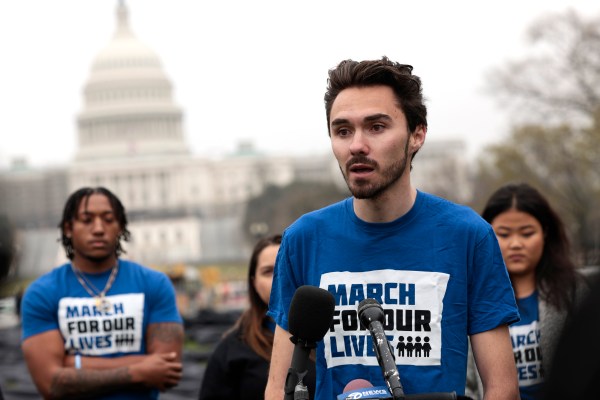Happy Thursday! Eighty years ago this morning, more than 150,000 men crossed the English Channel to liberate Nazi-occupied Europe. “You are about to embark upon the Great Crusade, toward which we have striven these many months,” Gen. Dwight D. Eisenhower wrote to the troops of the Allied Expeditionary Force on the eve of D-Day. “The eyes of the world are upon you. The hope and prayers of liberty-loving people everywhere march with you. … The tide has turned! The free men of the world are marching together to Victory!”
Quick Hits: Today’s Top Stories
- Israeli officials said the country’s leaders will soon determine whether to launch an offensive along its northern border with Lebanon to counter Hezbollah militant forces. “We are prepared for very intense action in the north,” Israeli Prime Minister Benjamin Netanyahu said Wednesday at a military base in northern Israel. “We said, at the start of the war, that we would restore security in both the south and the north—and this is what we are doing.” Later Wednesday, a Hezbollah drone attack in a northern Israeli town killed one Israeli reserve soldier and wounded 10 more people. Meanwhile, tens of thousands of Israelis marched through the Muslim Quarter of old Jerusalem to mark the city’s reunification in 1967. Eighteen demonstrators were arrested and many marchers shouted anti-Arab chants as they made their way through the city.
- The board of the United Nations nuclear watchdog, the International Atomic Energy Agency (IAEA), voted on Wednesday to censure the Iranian government for failing to fully comply with an IAEA investigation of its nuclear program. The censure—reportedly put forward by France, the United Kingdom, and Germany—is not legally binding, but comes after an IAEA report last week indicated Iran had increased its stockpile of near-weapons-grade uranium.
- Hunter Biden’s ex-wife, Kathleen Buhle, and ex-girlfriend, Zoe Kestan, testified on Wednesday to Biden’s addiction to crack in 2018, bolstering federal prosecutors’ case against President Joe Biden’s son, who is currently standing trial on felony gun charges. Federal prosecutors allege that Biden intentionally violated federal law when he lied about his drug use on a form when purchasing a firearm. The gun seller also testified on Wednesday, the third day of the trial, saying he watched the younger Biden attest on the form, without hesitation, that he was not addicted to drugs when purchasing the gun.
- Georgia’s Court of Appeals on Wednesday paused proceedings in Fulton County District Attorney Fani Willis’ racketeering case against former President Donald Trump and more than a dozen other defendants for their efforts to overturn the results of the 2020 election in the state, pending the court’s review of Fulton County Judge Scott McAfee’s decision not to disqualify Willis from the case. McAfee had ruled in March that Willis could remain on the case so long as Nathan Wade—the special prosecutor Willis hired for the case and with whom she had a previous romantic relationship—resigned, which he did. The proceedings will likely be delayed until at least October, meaning the matter is unlikely to be resolved before the presidential election.
- Boeing’s Starliner spacecraft carrying two NASA astronauts successfully launched from Cape Canaveral, Florida, on Wednesday morning and began its 25-hour trek to the International Space Station. The mission had previously been aborted twice: on May 6 due to a rocket valve issue, and this past Saturday when a computer automatically shut down the second attempt—with four minutes left until launch. Meanwhile, SpaceX is scheduled to launch an unmanned test flight of its Starship on Thursday morning, the fourth such mission for the largest and most powerful rocket ever launched.
- Police arrested 13 anti-Israel, pro-Palestinian protesters at Stanford University on Wednesday after the activists barricaded themselves inside university president Richard Saller’s office that morning and demanded the school vote to divest from companies supporting the Israeli military. One campus safety officer was reportedly injured while clearing the activists out of the building. In a statement, Stanford officials said many senior students who occupied the office would “not be allowed to graduate,” though it’s unclear whether that meant they would not be allowed to walk in the upcoming graduation ceremony or would be denied a diploma.
Biden Stares Down Border Security

In a game of political hot potato as old as time, President Joe Biden finally bobbled the steaming hot border security spud on Tuesday by issuing a proclamation that would potentially limit asylum claims between ports of entry at the U.S. southern border.
“I’ve come here today to do what the Republicans in Congress refuse to do: take the necessary steps to secure our border,” he declared. “Today, I’m moving past Republican obstruction and using the executive authorities available to me as president to do what I can on my own to address the border.”
The proclamation Biden issued Tuesday matches the general framework of the twice-killed bipartisan border compromise bill: limiting asylum claims between ports of entry after a certain number of apprehensions in a given day—with key exceptions. But Biden’s effort in the fourth year of his presidency to address the crisis at the border—with the November election looming—will likely face legal challenges, and may not survive.
As we’ve covered extensively in this newsletter, this saga dates back many months. At the beginning of the year, Sens. James Lankford, a Republican, Chris Murphy, a Democrat, and Kyrsten Sinema, an independent, released a compromise they’d negotiated that, among other provisions, included changes to expedite asylum claims and a threshold on the number of encounters that would trigger a border shutdown. Republicans threw cold water on that deal in February—at former President Donald Trump’s behest—but last month Senate Majority Leader Chuck Schumer tried to resurrect it, seemingly as a political ploy to get Republicans to vote against it, as even Schumer predicted it would fail. “I will be honest,” he wrote in a letter to his colleagues before reintroducing the bill. “I do not expect all Democrats to support this legislation. Many of our colleagues do not support some of the provisions in this legislation, nor do I expect all Republicans to agree to every provision.” Indeed, it failed 43-50.
With Congress stalled on legislative immigration action, Biden took matters into his own hands this week—and took the opportunity to try to make some political hay out of a bad issue for him. A recent Economist/YouGov poll underscored Biden’s electoral problem when it comes to the border: 86 percent of respondents said immigration was important to them, with 52 percent specifying it was “very” important to them. And voters don’t give the White House high marks, with 59 percent of respondents disapproving of Biden’s handling of the issue.
As a matter of policy, Biden’s proclamation effectively closes the border to noncitizens when the number of encounters at the southern border—a figure measuring the number of apprehensions, rather than the number of unique individuals Customs and Border Protection (CBP) arrests—exceeds 2,500 in a single day. The border would only “reopen,” allowing migrants to claim asylum and the court system to begin processing their claims, “14 calendar days after the Secretary [of Homeland Security] makes a factual determination that there has been a 7-consecutive-calendar-day average of less than 1,500 encounters”—something that has not happened even once since Biden took office.
Given current migrant levels, the proclamation went into effect at 12:01 a.m. on Wednesday. The 2,500-per-day limit—much lower than the one included in the bipartisan border compromise bill—will allow CBP agents to expel migrants without allowing them to lodge an asylum claim, as is generally a migrant’s right under Title 8 of the U.S. code and which would eventually be adjudicated to see if the migrant had “credible fear” of persecution.
Migrants at the southern border who lodge asylum claims are often released into the interior of the country as their case winds its way through the overburdened court system—a fairly desirable state of affairs for the average migrant coming from an impoverished country. “This ban will remain in place until the number of people trying to enter illegally is reduced to a level that our system can effectively manage,” Biden said Tuesday.
But not all noncitizens who try to cross the border would be barred from seeking asylum. Instead, the proclamation targets those who attempt to cross between legal ports of entry. The order makes an exception for asylum-seekers “who arrive in the United States at a southwest land border port of entry pursuant to a process the Secretary of Homeland Security determines is appropriate to allow for the safe and orderly entry of noncitizens into the United States.”
In other words, the order excludes migrants who book an appointment with a CBP agent on the CBP One app—which the administration has used for years to encourage a more “orderly” situation at the border and discourage crossings between ports of entry. The order also excludes unaccompanied minors from the expulsion requirement and does not change the parole system, which the Biden administration has used to allow thousands of migrants from Cuba, Haiti, Nicaragua, and Venezuela into the U.S. under certain conditions.
The total number of CBP encounters at the southwest border this year, including apprehensions that resulted from a CBP One app appointment, seems set to outstrip last year’s already eye-popping total. Between October and April—the 2024 fiscal year so far—there were more than 1.5 million encounters at the southern border. During the same period last year, the figure was around 1.4 million; there were ultimately nearly 2.5 million encounters in the 2023 fiscal year, the third-straight record-breaking year.
The consequences of a porous border and the overburdened system can be dire, as the last several months have illustrated. This week, a Venezuelan migrant who crossed the border illegally in Eagle Pass, Texas, shot two New York police officers in Queens. Another illegal immigrant, Jose Ibarra, was indicted in May for the brutal murder of Laken Riley, a 22-year-old Augusta University student found beaten and asphyxiated to death on the University of Georgia campus in February. Ibarra had been arrested and released several times in the roughly 18 months since he crossed the border illegally.
But rather than reduce chaos, some believe Biden’s order this week could ultimately incentivize it by making it much harder to claim asylum simply by turning oneself in to a CBP agent. “If the order is effective at denying people who cross illegally, it will cause more people to enter illegally and try to evade detection rather than turn themselves in for asylum,” argued David Bier, director of immigration studies at the libertarian Cato Institute. “Evasions mean more trespassing on private property, more car chases with smugglers, and more confrontations between Border Patrol agents and migrants.” This could potentially increase the number of “gotaways,” which had fallen since the end of a similar border shutdown regime—the pandemic-era Title 42 authority—in May 2023.
Senate Republicans don’t expect Biden’s actions Tuesday to make a dent in the number of encounters. “The question is whether it will actually be effective to secure the border,” Sen. John Cornyn of Texas told TMD. “I don’t believe it will, in large part because it’s full of exceptions that will overwhelm the rule.”
But many of Biden’s GOP critics—plenty of whom have for months demanded that Biden act to secure the border—also don’t think Biden or the Democrats are serious about trying. “[Democrats] think these people will vote for them in the future,” Republican Sen. Roger Marshall of Kansas told TMD, speaking of migrants crossing the border. “[Democrats will] do everything they can to get more illegal migrants to come into this country.”
It’s worth pointing out that, although people who have been granted asylum may after several years become legal residents and eventually citizens with voting rights, noncitizens cannot vote in U.S. state and federal elections. That said, the number of people granted asylum each year is extremely low relative to the number of filings, nevermind the number of encounters with migrants at the border. In 2022, for example, 36,615 people were granted asylum in the U.S., according to the Department of Homeland Security.
Even so, political considerations have always played a role in the parties’ decades-long impasse on comprehensive immigration reform. “I don’t think [Biden is] really serious about [securing the border],” Cornyn told TMD. “I think this is something he felt compelled to do because he knew that this was a huge political liability and he needed to try to deal with it.”
The belief that the other side is operating in bad faith isn’t unique to GOP lawmakers. “Republicans have made the clear decision [that] they want the border to be a mess,” Murphy, who negotiated the original compromise bill on behalf of Democrats, told TMD. “They are going to do nothing to help the president try to control the border because they believe the only way that Donald Trump can be elected is if the border is chaotic.”
But neither is it true that Democrats are uniformly in favor of Biden’s actions. “Today’s executive order severely limits access to asylum and is deeply concerning to our caucus,” the leaders of the Congressional Hispanic Caucus—Democratic Reps. Nanette Barragán of California, Adriano Espaillat of New York, and Sylvia Garcia of Texas—said Tuesday. “Enforcement-only strategies have repeatedly proven ineffective and only create more chaos at the border.” Progressive Democratic Sen. Elizabeth Warren of Massachusetts likewise said the country can “do better than a functional ban on asylum,” a sentiment echoed by progressive colleagues in the House and Senate.
Whether Biden’s proclamation is indeed a “functional”—and unlawful—ban on asylum is sure to be tested in court. The American Civil Liberties Union has already said it will sue the Biden administration over the order, and compared it to former President Donald Trump’s legally fraught effort to deny entry to migrants moving in a caravan toward the border in 2018. Like Biden’s order, the Trump proclamation denied asylum to anyone entering between ports of entry.
The provision in Title 8 both Trump and Biden used to justify their orders gives the president the power to “suspend the entry of all aliens or any class of aliens as immigrants or nonimmigrants” if “the entry of any aliens or of any class of aliens into the United States would be detrimental to the interests of the United States.” The question is whether that measure is expansive enough to override other provisions in the same title, including one that says “any alien who is physically present in the United States … whether or not at a designated port of arrival” may apply for asylum.
“I think that there’s a very strong argument that this authority is sort of all-encompassing,” Kristie De Peña, director of immigration policy at the Niskanen Center, told TMD. In Hawaii v. Trump—the case that decided the so-called “Muslim Ban” which Trump pursued under the same authority and addressed different facts—the Supreme Court seemed inclined to agree. Chief Justice John Roberts argued the statute “exudes deference to the President in every clause.”
But try telling a member of Congress to show deference to the president—even one of his or her own party. “I don’t think the president has the authority to do this,” Murphy told reporters Wednesday. “I think there’s very little room for the administration to act unilaterally at the border. They cannot conjure new resources. They cannot fundamentally change asylum laws. I doubt that they can shut down the border. So I think the only thing that fixes the border is legislation.”
Worth Your Time
- For the New York Times, Roger Cohen filed a dispatch—with stunning photos by Laetitia Vancon—from the D-Day commemorations in France, marked not just by the ever-dwindling number of survivors but by the pall of another war in Europe. “When the 90th anniversary of D-Day comes around in 2034, there may be no more vets,” he wrote. “Living memory of the beaches of their sacrifice will be no more. … There are 9,388 graves in the [Colleville-sur-Mer American] cemetery, most of them in the form of white Latin crosses, a handful of them Stars of David commemorating Jewish American service members. As antisemitism rises again in Europe, they seem somehow more conspicuous. … With war back in Europe, the ghosts that have haunted the continent feel closer, when two decades ago it appeared they had been laid to rest. The European Union was created to put an end to war and has proved a peace magnet. NATO has been Europe’s military guarantor. The two institutions have held the line, but the line between the world and war feels flimsier today than in a long time. It has been hard to escape that feeling even in a festive Normandy.”
Presented Without Comment
Former President Donald Trump, on Truth Social
JOE BIDEN IS NOT TOO OLD TO BE PRESIDENT—NOT EVEN CLOSE, BUT HE IS TOO INCOMPETENT AND CORRUPT!
Also Presented Without Comment
BBC: Woman Charged After Milkshake Thrown Over [Reform U.K. Leader Nigel] Farage
Also Also Presented Without Comment
Washington Post: Cat Roams University Campus For 4 Years, Gets Doctoral Degree
In the Zeitgeist
D-Day veterans traveled to the beaches of Normandy, France, this week to commemorate the 80th anniversary of D-Day. For some veterans, this visit will mark their first return to the region since that brutal battle that turned the tide of the war and paved the way for freedom.
“That was our main concern,” said Felix Maurizio, a 99-year old World War II veteran who last saw the beach as a 19-year-old. “The freedom of this country.”
Toeing the Company Line
- In the newsletters: The Dispatch Politics crew reported on plans from GOP lawmakers to prosecute Democrats in retaliation to Trump’s guilty verdict, Scott examined the (🔒) economic benefits of remote work, Jonah argued that (🔒) Biden’s missteps stem are more about who Biden is than how old he is, and Nick evaluated (🔒) how the Biden campaign could more effectively talk about the president’s age.
- On the podcasts: Mike joins Jonah on today’s episode of The Remnant to unpack the legal news of the week.
- On the site: Patrick Brown argues against progressive doomerism over child care policy, and Gil Guerra examines how Mexico’s new president could upend border policy with the U.S.
Let Us Know
Do you think Biden’s executive order will appeal to voters worried about immigration?











Please note that we at The Dispatch hold ourselves, our work, and our commenters to a higher standard than other places on the internet. We welcome comments that foster genuine debate or discussion—including comments critical of us or our work—but responses that include ad hominem attacks on fellow Dispatch members or are intended to stoke fear and anger may be moderated.
With your membership, you only have the ability to comment on The Morning Dispatch articles. Consider upgrading to join the conversation everywhere.